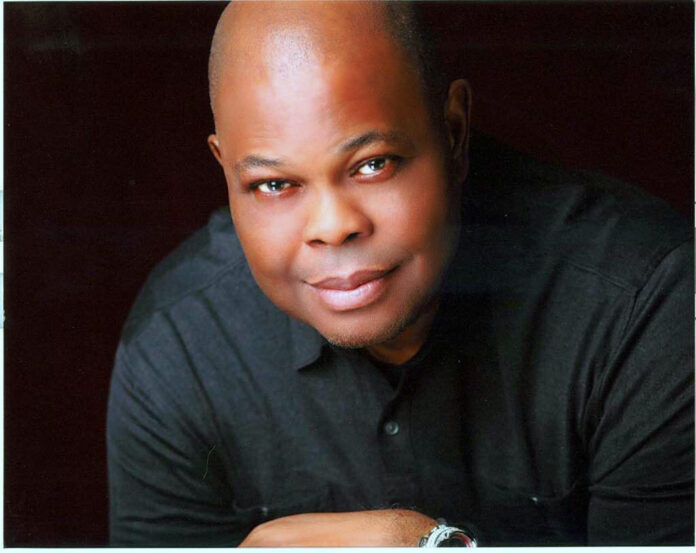Kano, our Kano, in search of enemies: Professor Ahmed Bako in his inaugural lecture presented a hopeless document lacking in clarity and authenticity that mostly lost sight of the possibilities that exist in the hidden and marginalized history of Nigeria. Someone must tell Bako that a lie, is still a lie, even if everyone believes it, and that the truth is still the truth, even if no one believes it, and that Kano is our Kano, and that those who are working deviously and tirelessly in search of the enemies of Kano, are working in vain.
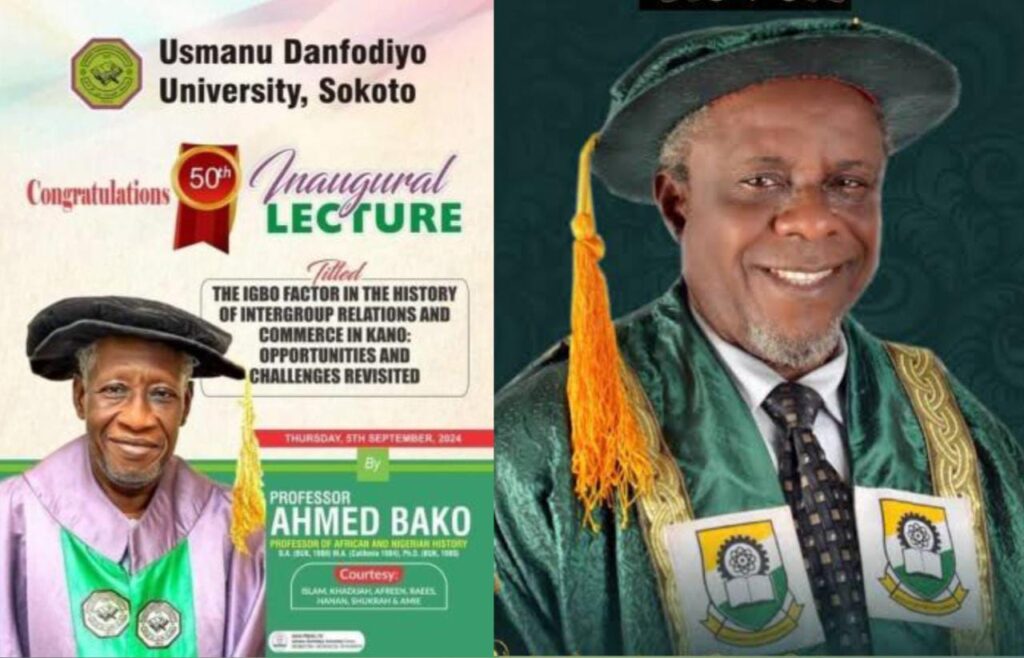
- Prof Ahmed Bako
Just recently, a professor of history from the Usman Dan Fodiyo University in Sokoto, Professor Ahmed Bako, delivered his much-touted Inaugural Lecture titled: “The Igbo Factor in the History of Inter-Group Relations and Commerce in Kano”. This lecture has generated wide-spread reaction from a cross section of Nigerians, and mostly from the Igbo, who became the subject of Professor Bako’s diatribe. It was a lecture that many considered to have stretched the boundaries of the conscience of the subject, and bastardized the history of the times as presented by the lecturer. It was considered to be a total desecration of history as a subject, and a study that has, hitherto, suffered many untold hardships, distortion and neglect within the Nigerian paradigm.
The cynicism imbedded in this lecture, and the arrogance, or perhaps the ignorance of the facts in the history of that era, were grossly exposed in Bako’s lies and utter embellishment of half-truths in his widely advertised “academic work”, which embarrassingly, turned out to be a reprehensible tales-by-moonlight gloating of a revisionist with an imbued tribal sentimentalism, by a thorough-bred clannish apologist.
Professor Bako’s objective in writing and giving that lecture must have been anything other than to give the world a candid glimpse into the history of our country’s past; a past that is so checkered, and soaked in the blood of many of its citizens. Bako’s history had its story backward. He forgot that it is the duty, and the unequivocal right of Nigerians, historians or not, to investigate and interrogate history, and to dissect what he has produced for the world to view as truths. Even as we must grant Bako his constitutional right of freedom of speech, this freedom does not warrant the telling and spreading of lies, as it constitutes as bad law and warped ethics to do so, and must worry us as being part of the unfortunate relic of the government dominated by Professor Bako’s kinsmen and allies who banned, banished and descended on the study of history in our schools after the rancid civil war.
It is equally important to examine why I feel the compulsion and duty to respond to Professor Bako’s lecture. Is it because I am Igbo or because I am a historian? No, but I feel compelled from my vantage position to give the discerning reading public my first-hand knowledge of the subject matter, as I attempt to open up the last veils of the wicked distortions of our history by those who should know better; those who cloak themselves in that sacred toga of intellectualism and in their ugly trends of, and journeys to destroying our history. I also chose to tell or retell Bako’s story because, like the saying goes; the hunted must learn to tell the history of the hunt, else, the hunter will reserve and seize the exclusive rights to the history, and in so doing, distort in his or her favour, the true story of the hunt. Professor Bako may be thinking that he is the hunter, and may have grievously sublimated the history of Kano. And this is a shame.
I feel somewhat confident that I qualify, and reserve the rights to question Professor Bako’s history of Kano, and in doing so, I presume that I may even stand a better chance of telling this history better than Bako, despite his desperate patriarchal claim to the soul and soil of the ancient city of Kano. In addition, his bold confiscation and mutilation of the happenings there, call for a rapid intervention.
READ ALSO: Ahmed Bako’s intellectual masturbation as inaugural lecture
I was born in Kano a few years before Bako, and before Nigeria claimed its independence from Britain. With my family, we were fully entrenched in the culture, politics, trade and traditions of the peoples and the city of Kano, Northern Nigeria. My father, Chukwuma, came to Kano in the mid-1940s to continue in his career as a journalist. He was there specifically to establish The COMET newspaper, one of the many newspapers he had edited from the stable of Dr. Azikiwe’s media empire. Chukwuma Anueyiagu was a young and a dynamic budding journalist, who was very soon to cultivate and secure the acquaintance and friendship of many notable Kano intelligentsia, politicians, business persons and members of the traditional royal families. He had recruited and employed many brilliant young Kano indigenes to work in his newspapers. Amongst those Kano hotheads were Maitama Sule, Magaji Danbatta, and many others who embraced the profession with such zeal and proficiency.
At a particular point in time, Kano’s emergence as a tour-de-force became very pivotal in the overall affairs of the entire country, be it in politics or in commerce. The role of the news media became an integral and an essential part of the evolution. My father found a prominent position in the equation, as his job as a busy journalist overlapped with local and national politics and business in Kano. As a child growing up within this environment, I began to witness the influx of politicians into our homes and in our activities. Malam Aminu Kano was one of my father’s favourite politicians, because of his radical and anti-establishment dispositions which were my father’s ideological leaning as well. Malam Aminu and my father established one of the strongest bonds and friendships between persons from two separate backgrounds. The personal stories that I am attempting to build here, is to clearly establish a prima facie evidence of my strong, well nurtured and properly maintained contacts with the people and the history of Kano.
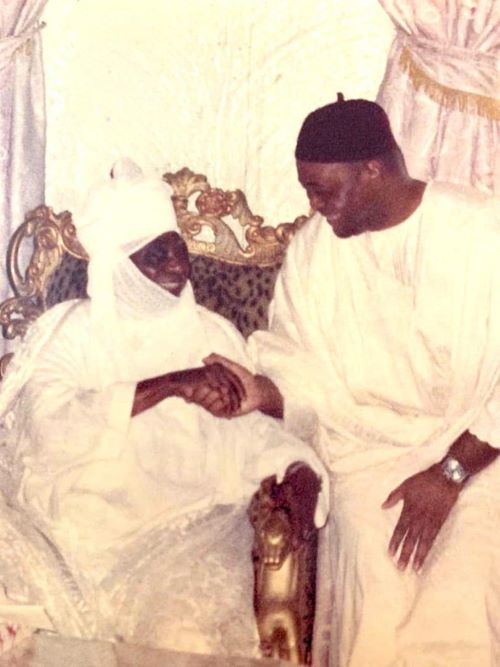
- Dr. Okey Anueyiagu with the late Emir of Kano, His Highness Alhaji Ado Bayero, at his palace in kano
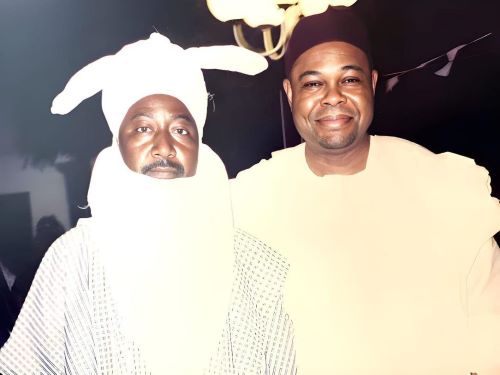
Anueyiagu with one of Ado Bayero’s sons
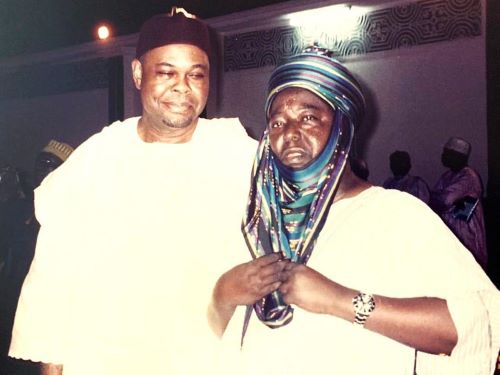
Anueyiagu with another Bayero
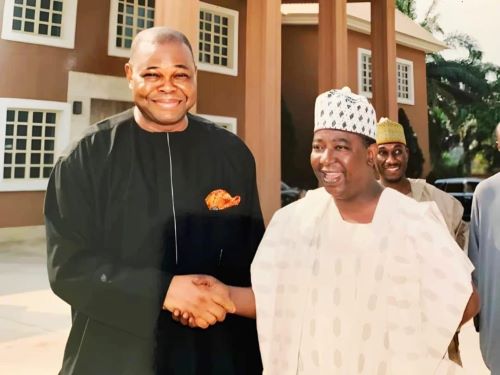
- Dr. Okey Anueyiagu hosting another Bayero in his Awka home
The city of Kano at the point in time, was a melting pot of sorts, and was a bustling metropolitan city of mainly Hausa and Fulani indigenes who were mostly nomadic in nature and trading in goods and services. There was also a pretty large composition of other tribal settlers of mainly Igbo, Yoruba and Kanuri who made up the teeming population of the once beautiful and accommodating city of Kano. The most prominent citizen of the city of Kano was its most revered, respected and loved Emir, Ado Bayero. This enigmatic figure was one of the most welcoming and accommodating leaders that our country has ever known. He raised the bar of the traditional leadership so high to an unimaginable level that endeared him to all that dwelled within the confines of Bayero’s emirate. Despite his deep inclination to the traditional ethos and dictates of his highly exalted office, Bayero managed a magnificent balance that allowed others from different hues to feel at home in Kano. Ado Bayero was a great leader, a spiritual guide and a peacemaker with a tremendous quiet dignity and stupendous moral character and rectitude. Until the1966 crisis that assumed a wide dimension beyond Bayero’s control, the Emir of Kano had the magic wand that he used to bring all the dwellers in Kano to live in relative peace. My father and the Emir began a friendship and brotherhood that lasted for decades and outlived them and ultimately got transferred to their offsprings.
The history of Nigeria is not that complicated, but when left in the hands of scholars like Professor Bako, it will be extinguished and dismembered with impunity. The history of Kano presents even simpler narratives despite what seems like a ploy and plot to create strategic ambiguity and unnecessary complexity about the known factual history of the past by people like Ahmed Bako. The work of Bako has received extensive scrutiny, with most describing it as empty, vacuous and pure prejudice of a very subpar and poorly trained historian. He was chastised for the many missing gaps in his lecture, and for lacking proper veneration of his own chosen field and discipline. Many dismissed Bako’s pusillanimous effort with such loud sibilation, and with such laconic glee. The mendacity of the professor’s so-called intellectual work, did not end with the many messy and stupid mistakes and errors conspicuously evident throughout his lecture, but spread wide into the core substance of it. The plethora of the amount of malfeasance displayed by Bako, and his lack of proper constructive perspective in this lecture, calls to question his qualification to occupy the position of a professor, and of his selection to give this lecture.
I believe that history is not only about our past, but that it is about our today and our tomorrow. Because we are all our history, we must all carry our history with us, and must never allow our history to be rewritten, rebranded and misrepresented to the world as the truth by dubious historians like Ahmed Bako. It is, therefore, our inalienable duty to seize our history and make accountable metaphors of it, by telling it exactly how it happened without being afraid and without telling lies and “bakorizing” our past.
Do historians lie? Yes, they do. Are they allowed to do so? No, and they must never be allowed to distort our history. Presently, the most belligerent ills plaguing and pervading all aspect of our lives today, is lying. The perniciousness and impetuosity of this malady has become deleterious. But the most dangerous part of this disturbing trend, is when our intellectuals engage in this act of lying. My expectation was that this practice of lying and telling untruths was in the exclusive preserves of our politicians and our prosperity preachers. And now our historians, the custodians of our past, present and future, have become foxes like the politicians who cunningly turn everything they know to be true into lies, and habitually make it an obligation to always see honesty as an impossibility and an antithesis of the game of life. Professor Bako has joined, occupied and adopted this doctrine, and has, in his lecture, deployed its practice and manifestation into praxis.
Many of Professor Bako’s critics have dissected and mercilessly pointed out the many mistakes and errors in his lecture with the exposure of the fatuousness and the bafflegab in it. Equally exposed are the incomprehensible verbiage and the apoplectic indignation in his treatment of the Igbo sojourners to Kano. Bako’s texts were so rebarbative that it alienated even those that may have given him the benefit of doubt. His complete aversion to decency and his negative inclinations repelled many. Theoretically, Bako ignored the basic anthropogenic origin of the history of Kano and began to excavate skeletons that never were buried. He willfully adjudicated lies and untruths in making unfounded judgement on matters that were never in dispute. His level of ambivalence in his clannish lecture displayed a tralatitious tendency prevalent in his clime, often passed off as smartness.
He called the Igbo; “desperate, domineering, aggressive, criminals”, and told uncountable and fantastic lies about them. This reckless academic work by a professor is indeed tough and unlikely to be classified as a document worthy of the attention being accorded it. How can one ever trust any serious contributions coming out of this man’s field, or from his institution? As trust is one of the vital determinants of the stability of our lives and our institutions, as people like Bako infest us with lies, there will be an inclination to distrust our moral civic behaviour. It is evident that once the people in authority, be they in academia, politics, or government, stop their lying game, we will begin to see that there is theoretical and empirical evidence of a correlation between truth, trust and a peaceful cohabitation within a productive and prosperous society.
The gimmickry in Professor Bako’s lecture and the more than salutary lies in it are intrinsically evil. I have chosen to leave the specific rebuttal of his deliberate lies to the professionals who so far, are doing justice to him. It is obvious that Bako abhorrently hid the truth when he delivered his lecture, and that by doing so, became a liar, and that all those who listened and read through his lies and kept quiet, are in reality, liars themselves. How our past informs our present in beautiful or even in tragic ways must be every reasonable person’s primary concern as we constantly seek ways and means to correct the ills of our past and of our bewildering and blurry history. Only when this is done, and implemented correctly to the fullest, and in the most transparent manner, can we build a virile and strong country.
The Kano story is part of my life. It is my story, but not a fiction. It is a story of the creation of the meeting of many diverse and multiple cultures as a melting pot that at a time was thriving beauty, and also of a system that failed us all. A more courageous historian, one that is not owned by blind tribalism and inept academic acumen, could have told this history better, more accurately and without bias and the avarice of ethnic chauvinism.
Professor Ahmed Bako’s classification of the Igbo dwellers in Kano as criminals, land grabbers, thieves, cheaters, self-centered, a drain on the Kano economy, and many other acrimonious and unsubstantiated innuendos and lies, was a direct and personal attack on my person and my immediate family. This was particularly distressing to me, as it touches the innermost core of my being, shaking my spirit and soul to the soles of my feet. This is so because my father transitioned from his career as a very successful journalist who was at the vanguard of those who used the media to win our country its independence, to a politician and a very thriving business mogul in Kano and beyond. He established world-class hotels, petrol stations, printing press and bookstores, bottling companies, farms, transportation and manufacturing ventures. All these he did without grabbing anyone’s lands, or engaging in any criminal activities. He invested his blood, sweat and tears in Kano without draining the economy in order to develop his home town of Awka.
Bako has insulted and desecrated the spirits of our forebears who contributed to the development of Kano. My father would have been particularly disturbed about this lecture reckoning about how he, as the Chairman of the Ibo Union established schools with other Igbo patriots that were inclusive to all, but to be carelessly discredited by Bako as ethnic schools. I attended these schools and can confidently attest to the fact that many non-Igbo were admitted to these schools, and that a lot of them have become prominent citizens of this country. Professor Bako, must be told that the Igbo, eager to educate the mind, ventured into education philanthropy not to dominate, but to enrich the world.
My father like most other Igbo dwellers in Kano lost virtually everything they toiled and labored to build in Kano, to the crisis and the war. But the most grievious of this unfortunate tragedy, is that thousands of these Igbo dwellers in Kano lost their lives to the vagaries and wickedness of the pogrom. I personally witnessed the brutal killings and the looting of Igbo people, and count myself lucky to have escaped the heinous fate that befell other Igbo, including children, women, and even the pregnant ones. And Professor Bako did not find a place in his wicked heart and his poisonous pen to spare a moment of tribute or even compassion for these innocent souls. How can Bako, a living human being have joy and laughter in his writing when the world of others is ablaze? Is he too weak and wicked by unaided reason to find out truth? Mr. Bako, you must know and acknowledge that universally, history is a conscious self-mediating process, and a spiritual journey, that when respected, empties into time, and that doing wrong is worse than suffering wrong.
In my book; Biafra, The Horrors of War, The Story of a Child Soldier, I dedicated one whole chapter to my life in Kano with glow, and also, narrated the sordid event of the killing in 1966 of the Easterners, mostly of the Igbo stock by indigenes of Kano. Today, what relates to my dedication to the city of Kano where I was born and raised, despite the horrible shortcomings, is my love of the ideals and realities evident in our earlier cohabitation that promised good life, liberty and the pursuit of happiness; those virtues that Professor Ahmed Bako never expressed in his lecture.
Today, it seems that the history and the lessons of Kano have been consigned in very narrow prisms, and in the filthy dustbins of the scanty soiled memories of “historians” and “false story-tellers” like Ahmed Bako, and that the fissiparous forces of division, hatred and darkness have once again appeared and descended in our land, dripping with deadly lies. The gripping and memorable history of Kano, which I pride myself as an integral component of, and some of its vitriolic past that have been denied its people, and also told upside down by Bako, is principally responsible for our continuing failure at national reconciliation, forgiveness and healing.
Denying us the correct history of our past as Bako and others may have done, is so injurious and cruel, and is a shameful obliteration of our civil, constitutional and moral principles, and an ultimate defeat of our goals to the triumph of equity, empathy, fairness, cohesion, justice and truthfulness. This is so, because the price of freedom and emancipation, is embedded in the knowledge of truth, and not in the rush to rubbish the history of our past by Ahmed Bako and company, and by people who laboriously and with mythical myopism, paint a picture and weave concocted stories about our country in the cloak of an academic exercise.
Professor Ahmed Bako in his inaugural lecture presented a hopeless document lacking in clarity and authenticity that mostly lost sight of the possibilities that exist in the hidden and marginalized history of Nigeria. Someone must tell Bako that a lie, is still a lie, even if everyone believes it, and that the truth is still the truth, even if no one believes it, and that Kano is our Kano, and that those who are working deviously and tirelessly in search of the enemies of Kano, are working in vain.
- Okey Anueyiagu, the author of “Biafra, The Horrors of War, The Story of A Child Soldier” is a Professor of Political Economy


